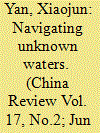| Srl | Item |
| 1 |
ID:
153567


|
|
|
|
|
| Summary/Abstract |
In the wake of the global economic crisis of 2008, the Chinese state has
enhanced its systematic eff orts to rebuild Communist Party branches in
private enterprises. Th is article examines such eff orts with specifi c reference
to the campaign initiated in 2012 in Anhui province, one of the
most recent initiatives undertaken by the party-state to infi ltrate the
country’s huge and still-growing private sector. Th e article examines the
emerging and dynamic institutional links between provincial party-state
apparatus and local private businesses in Anhui and highlights the four
key methods used by the Chinese Communist Party (CCP) to extend
its control over the increasingly powerful and infl uential private sector.
Th ese mechanisms are establishing new offi cial institutions to coordinate
CCP aff airs related to the private sector, “sending down” a group
of “party-building instructors,” rewarding private business elites with
appointments to party positions, and reorienting the work of local party
organs to better serve the needs of the private sector. Although this
business-oriented party building has indeed made the CCP more
relevant to private business development and thus increased its organizational
presence, it remains unclear whether these eff orts have genuinely
strengthened the Communist Party’s control of the private sector.
|
|
|
|
|
|
|
|
|
|
|
|
|
|
|
|
| 2 |
ID:
158545


|
|
|
|
|
| Summary/Abstract |
Given recent urbanization and land development projects in western China, this study examines how rural villages became part of the expanding municipality of Yinchuan, Ningxia, by focusing on former peasants' occupation transition—their transition into urban employment. Based on the survey and interview data in the outskirts of Yinchuan in 2014 and 2015, the study finds an increase in unemployment rates and the changing distribution of job categories. Quantitative findings highlight the importance of age, gender, and education after land expropriation when agriculture ceases to function as a "safety net," and illustrate the significant effect of pre-expropriation employment but not compensation from land development per se. Such findings are explained and enriched by analyses of in-depth interviews, that most available jobs for older and less educated peasants are unstable and low-end work in construction and service sectors created by urbanization. There are also limited chances to establish and develop one's career, either for those who had prior market experiences and financial capabilities to start private businesses, or for those received heavy education investment from their families in a hope of obtaining clerical or professional jobs. Men are more active in pursuing private businesses and formal white-collar jobs by pooling together the family resources, and women are underrepresented in both sectors. Speaking to the debates on the labor market outcomes for former peasants in urbanization, this study illustrates the emerging opportunities of entrepreneur-ship and economic mobility and the prevalent segregation and discrimination in labor markets.
|
|
|
|
|
|
|
|
|
|
|
|
|
|
|
|